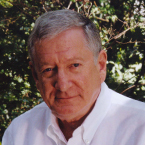
Alfred Goodman Gilman, MD, PhD, Nobel laureate and fellow of the AACR Academy, died Dec. 23, 2015, at the age of 74. Gilman, regental professor emeritus of pharmacology at the University of Texas (UT) Southwestern Medical Center in Dallas, had a distinguished career as a pharmacology professor, medical school administrator, and industry advisor.
Gilman shared the 1994 Nobel Prize in physiology or medicine with his colleague Martin Rodbell, PhD, for their discovery of guanine nucleotide-binding regular proteins (G proteins) and the role of these proteins in intracellular signal transduction.
This pioneering research regarding G proteins provided a basis for understanding fundamental principles governing cell communication and signal transduction. This research has since resulted in the development of a large number of therapeutic agents that specifically target receptors that interact with G proteins. Collectively, these findings have had profound effects on the understanding of diseases ranging from cancer to cholera. Gilman and colleagues also elucidated the structure and mechanism of regulation of adenylyl cyclase, an important target of G proteins, demonstrating how stimulatory and inhibitory G proteins are capable of regulating the enzyme bidirectionally by interactions at pseudo-symmetrical sites.
Born July 1, 1941, in New Haven, Connecticut, Gilman was exposed to science in childhood; his father was a renowned pharmacologist at Yale University, and then founding head of pharmacology at the Albert Einstein School of Medicine at Yeshiva University in New York. Gilman earned his bachelor ‘s degree in biochemistry at Yale in 1962, and his medical degree and a doctorate in pharmacology from Case Western Reserve University in Cleveland in 1969.
Following postdoctoral training in the Laboratory of Biochemical Genetics at the National Institutes of Health (1969-1971), Gilman joined the faculty at the University of Virginia in Charlottesville, where he served for 10 years in several positions, including professor in the Department of Pharmacology and director of the medical scientist training program. His research involving mutant leukemia cells at the University of Virginia during this time led to his Nobel-winning discovery of G proteins.
Gilman became chair of the Department of Pharmacology at UT Southwestern Medical Center in 1981. He was named dean of the Southwestern Medical School in 2004, and executive vice president for academic affairs and provost of the UT Southwestern Medical Center in 2006. Gilman retired from the university in 2009 to assume the role of chief scientific officer at the Cancer Prevention and Research Institute of Texas, a position in which he served until 2012. He was also co-founder and director of Regeneron Pharmaceuticals, Inc., and served as a director at Eli Lilly & Co.
In addition to his academic and industry duties, Gilman edited several editions of the renowned textbook, “The Pharmacological Basis of Therapeutics,” which his father, also named Alfred, originally co-authored with Louis S. Goodman, MD, and first published in 1941. The elder Gilman honored his colleague by giving his son the middle name of Goodman. Michael Brown, MD, a colleague of the younger Gilman ‘s at UT Southwestern Medical Center, noted that Gilman was probably the first scientist to be named after a textbook.
Gilman has been recognized with myriad honors and awards throughout his career in addition to the Nobel Prize and induction in the inaugural class of fellows of the AACR Academy in 2013, including the Albert Lasker Award for Basic Medical Research (1989), the Louisa Gross Horwitz Prize from Columbia University (1989), and membership in the National Academy of Sciences (1986).
Career Highlights
2009-2012 Chief Scientific Officer, Cancer Prevention and Research Institute of Texas
2006-2009 Executive Vice President for Academic Affairs and Provost, University of Texas Southwestern Medical School
2004-2009 Dean, University of Texas Southwestern Medical School
1997 Honorary Doctor of Medical Science, Yale University
2005-present Director, Eli Lilly & Co.
1995 Regental Professor of Pharmacology, University of Texas Southwest Medical School
1994 Nobel Prize in Physiology or Medicine
1990-present Co-founder and Director, Regeneron Pharmaceuticals, Inc.
1989 Louisa Gross Horwitz Prize, Columbia University
1989 Albert Lasker Award for Basic Medical Research
1986 Elected Member, National Academy of Sciences, Washington, DC
1981-2005 Chairman, Department of Pharmacology, University of Texas Southwestern Medical School
1977-1981 Professor of Pharmacology, University of Virginia School of Medicine
1969 MD., PhD, Case Western Reserve University